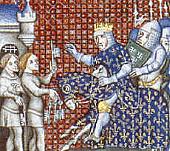
Louis VIII the Lion
(1187-1226).
King of France of
1223 to 1226
| PROSPERITY OF THE REPUBLIC |
| But Raymond VII was definitively beaten by the king of France, Louis VIII, and the Marseillais left a state of war where they had fought the pope, counters which they had a serious resentment. |  Louis VIII the Lion (1187-1226). King of France of 1223 to 1226 |
 Honorius III, Cencio Savelli, Pope of July 18 1216 to March 18 1227. |
The prior of Saint-Victor refused and resorted to the pope Honorius III. This one took the party of the monks naturally and threatened the Commune of excommunication if it persisted. The Marseillais were annoyed. They reversed the cross and the banner that Saint-Victor had placed on the palate of the Viscounts and faced the lightnings of the Vatican with impunity. Lastly, time calmed the spirits. A convention intervened, in which the City became tenant of the monks. |